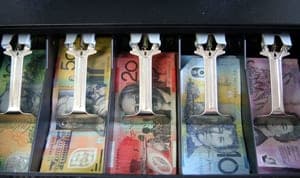Cashflow remains a key priority for small businesses, with Dun & Bradstreet’s latest trade payment survey showing payment terms have reached three-year highs, with the average time it takes a debtor to pay a bill jumping more than five days in the first quarter of 2011.
With cashflow back on the agenda, there’s evidence more businesses are reviewing their payment options to bring cash into the business faster.
Talent is in the choice
When electrician Jay Morgan started his business Mysparkyguy in November 2010 one of the decisions he had to make was around payment options.
“My bank gave me a few options, including cheque, mobile EFTPOS and BPAY. Cheque I discounted immediately and mobile EFTPOS was going to cost me at a minimum $55 a month – even if no transactions were done. BPAY was the best option because it helps keep my costs down,” he explains.
Lachlan Thomas, who has just started his IT consulting business, x2 IT, accepts payment largely via EFT. He says he doesn’t offer credit cards because of the fees.
But, says Diane Terzian, partner with accounting firm J I Moore & Partners, clients are asking for credit card payments to earn rewards points.
“We offer EFT, but we’re thinking about credit cards – it’s a matter of working out how to handle fees associated with these payments.”
Initial considerations
Decisions about payment methods should consider resources needed to manage the system. Accepting cash or cheques means trips to the bank – although cheques are probably a safer option than walking around with cash. But you have to wait for the cheque to clear to access the funds.
There’s a similar delay in receiving payments via EFT, credit cards and BPAY, albeit a shorter one compared to the time for cheques to clear.
Setting up systems
In terms of systems implementation, accepting cash involves a cash register or investment in a point of sale system (particularly for retailers). If you run a B2B enterprise you might get away with not having one of these systems.
If you don’t have a retail presence, less expensive options are EFT and BPAY. BPAY has recently worked with a number of financial institutions to offer smaller enterprises a simpler sign-up process. More small businesses are offering BPAY because it’s now easier to implement and adds credibility.
Philip Armstrong, CEO of the Australian Counselling Association, offers members the option to pay membership fees by credit card, EFT and BPAY. But he says “each credit card payment has to be individually reconciled, so it’s a drawn out process. With EFT, my membership officer has to reconcile our bank statements against the member’s bank details, which cuts down the time she spends doing her job.”
Susan Barker from paving and draining firm B&M’s Pave N Drain finds BPAY simplifies payment reconciliations. She says “for us, BPAY works better than EFT from an administrative perspective because it’s much easier to reconcile payments against customer accounts – the numbers match.”
A plus for small businesses that some credit cards offer is automatic downloading of statements into popular accounting packages. Most of the major banks allow you to download statements directly into a software accounting package, which means bank statements and accounting records are in sync, no matter how people pay your invoices.
Customer satisfaction
The other element to consider when deciding which payment options you offer will be credibility and customer satisfaction.
Philip Armstrong, says “giving our 3,000 members as many options to pay as possible can mean the difference between them maintaining their membership or not. Younger members would much rather pay bills electronically, so giving them the option to use EFT and BPAY makes sense.”
Ultimately, deciding which payment options to offer is about the balance between meeting customer needs and increasing business efficiencies, which depends on the business’s unique circumstances.
– Alexandra Cain is a freelance journalist

